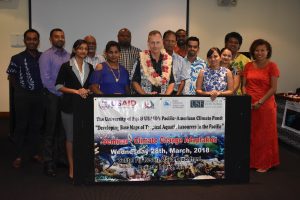The United States Agency for International Development (USAID) and the University of Fiji held a seminar on March 28, 2018 to present project results to government partners and private sector partners and to mark the completion of the USAID-supported, “Developing Base Maps of Tropical Aquatic Resources in the Pacific” project.
With support from USAID through its Pacific-American Climate Fund (PACAM), the University of Fiji used GIS satellite imagery to develop high-resolution base maps of coastal marine resources at two coastal communities in Fiji: Votua, Ba and Komave, Coral Coast. These maps can inform future environmental policies and enhance the management of the country’s coastal resources.
At the seminar, participants presented their studies in the field of marine coastal and resource mapping, as well as on adaptation strategies to prepare communities from extreme weather events and disasters. The seminar concluded with discussions on the way forward in research and by reviewing options for collaboration.
The USAID-University of Fiji partnership has resulted to two new courses that will be offered at the University of Fiji beginning September 2018. The new courses, which will be part of the university’s environmental science program, will help strengthen capacity to manage coastal marine resources. The project has also improved eight existing courses in the program by supporting site visits, providing training on capacity building and purchasing resource materials for students.
The partnership also collected regional satellite imagery to produce thematic maps that can highlight human uses and characteristics of global coastal ecosystems, including coral reefs, wetlands, and coastal aquaculture systems. The project is currently working on a user-friendly interface that will enable researchers and other stakeholders to access this information for free.
The project started in April 2015 and is scheduled to end in April 2018. It was implemented in partnership with the University of South Florida and Secretariat of the Pacific Community GeoScience Division.
USAID’s PACAM is a grant-making facility that assists twelve Pacific Island countries to reduce long-term vulnerabilities associated with extreme climate variations. Through PACAM, USAID awards grants to civil society organizations in support of adaptation measures and related “co-benefits”, such as livelihoods enhancement, improved health, food security, disaster risk reduction, and sustainable natural resources management.

![]()

